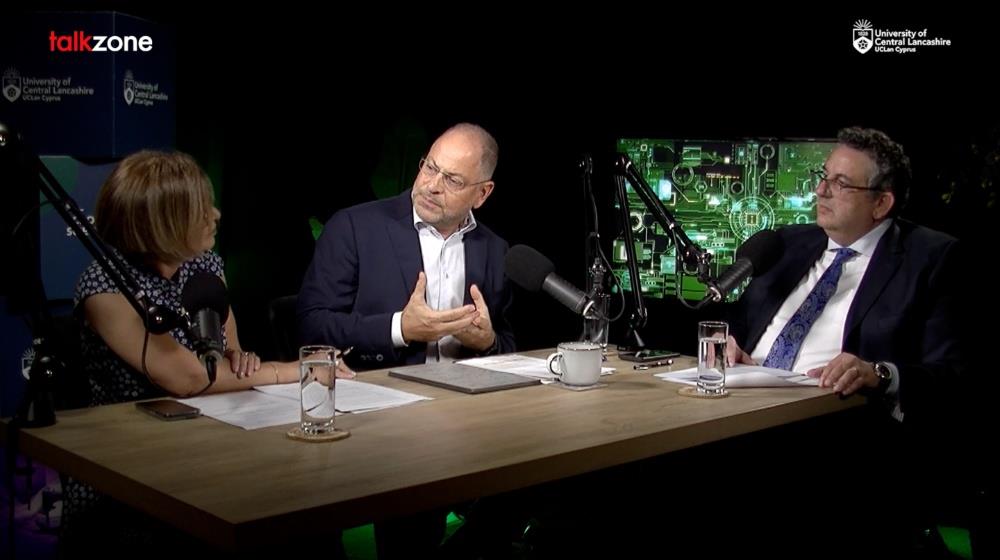The Chief Scientist of the Republic of Cyprus, Demetris Skourides, has launched a new podcast series titled 'Fearless Future,' placing people, purpose, and innovation at the centre of the AI conversation.
The first episode, 'The Future of Work in the Age of AI', was produced by UCLan Cyprus in its state-of-the-art media studio and streamed live on LinkedIn — marking the first podcast of its kind in Cyprus designed to be accessible to individuals, citizens, and organisations around the world.
Moderated by Nicoletta Papakyprianou, a seasoned HR transformation expert, the episode brought together Chief Scientist Skourides and Philippos Soseilos, CEO and Chairman of PwC Cyprus, for an urgent and visionary dialogue on how artificial intelligence is transforming the global workforce, a relevant press release notes.
“We are no longer asking if AI will transform our world — we are asking how, where, and to what end,” said Demetris Skourides. “The mission of Fearless Future is to shift the dialogue away from fear, and toward human-first, AI-enabled transformation. This podcast is an open invitation — not just to governments and businesses, but to every individual — to be part of this moment.”
The conversation was grounded in PwC’s 2025 'Global AI Jobs Barometer' and also drew insights from McKinsey’s 'Superagency in the Workplace,' IDC’s 'FutureScape GenAI Predictions', and the World Economic Forum’s 'Future of Jobs Report 2025'.
All four reports underscore a key shift: AI is driving productivity, unlocking human potential, and redefining the nature of value creation across industries. However, the future isn’t automatic — it requires vision, trust, leadership, and a shift in mindset. Skourides also provided insight into the lifelong learning that the National AI taskforce is working on, highlighting the need for everyone to embrace learning, the press release noted.
“AI is not replacing opportunity — it’s redefining and expanding it,” said Skourides. “The real challenge isn’t eliminating tasks — it’s redesigning jobs. Let machines take on the administrative burden so humans can focus on quality, insight, and innovation.”
Skourides added, “Over 90% of the data we use today was generated after COVID. This shows the unprecedented speed of digital acceleration — and the only way forward is to leverage AI intelligently to navigate that complexity.”
“We are at the beginning of a new era,” said Philippos Soseilos. “There is hesitation, but also tremendous potential. This is a moment for what I call ‘no-regret moves’ — staying informed, raising awareness, and beginning to experiment. Doing nothing is the greater risk.”
Soseilos emphasised that many employees are already using AI tools like ChatGPT to accelerate tasks but are afraid to admit it. “Organisations must create safe spaces for experimentation,” he added. “If people simply do the same job faster, they aren’t moving up the value chain. This is about transforming roles — not just enhancing speed.”
He also pointed to a critical economic shift: “By 2026, AI and automation are expected to drive $1 trillion in development gains. And by 2030, up to 30% of the global workforce could be impacted. That’s why organisations need to rethink roles and adapt now — before the gap widens.”
Skourides echoed this call for transformation through trust and culture: “Just like we once became cloud-first, maybe now we say we’re going to be AI-first. That means building a safe culture where people can experiment without fear — where using AI to save time and improve outcomes is celebrated, not hidden. AI has the potential to support the development of an environment where employees enjoy better work–life balance.”
The conversation also focused on the public sector and national AI strategy. Skourides detailed Cyprus’s approach through the National AI Task Force, which he has chaired since January 2025, bringing together academia, industry, and government to shape strategic priorities across research, industry use cases, and digital upskilling.
“Cyprus is 86% reliant on services. It’s a strong service-oriented economy. We are pivoting to a knowledge economy, and that requires careful planning — especially around infrastructure, workforce development, and collaboration with fast-moving startups,” said Skourides.
He highlighted the leadership and oversight role of the Deputy Ministry of Digital Policy, Research and Innovation, working together with Cyprus’s Human Resources Development Authority to boost digital skills. The HRDA has already rolled out over 15 training programmes and workshops that are available to the public.
A key highlight was the country’s 'AI for Government' initiative, led by the Deputy Ministry of Research, Innovation and Digital Policy, co-designed and implemented by the Research and Innovation Foundation, which enables innovation companies to solve real ministerial challenges — making the state a living laboratory for applied AI.
“Now is the time to build a clear and proactive AI strategy,” said Skourides. “AI is not and should not just be another tactic. It’s a fundamental shift in how we experience intelligence. The question for every organisation is: where does AI create value, where does it introduce risk, and what must we do to capture value and manage that risk?”
He called for businesses to pair technology adoption with a commitment to people — investing in lifelong learning and enabling each individual to grow alongside AI.
“This moment calls for curiosity, adaptability, and personal responsibility. The future belongs to those willing to learn, unlearn, and lead forward,” Skourides noted.
Soseilos also spoke to the strategic responsibility of organisations: “Having bold ambition is important. But it must be paired with trust. That trust comes from clear governance and responsible AI deployment — both at the state and organisational level. Only then can we unlock shared prosperity.”
He added, “The more capable AI becomes, the more data it needs. We’re not heading into a future where data stabilises — we’re heading into one where the demand for data accelerates. Organisations need to be ready for that scale.”
Moderator Nicoletta Papakyprianou encouraged continued curiosity and inclusion: “We designed Fearless Future to be accessible to everyone. You don’t have to be a technologist or policymaker to join this conversation. If you’re navigating change, leading a team, or thinking about your future career — this podcast is for you.”
In his closing remarks, Skourides emphasised the work that the Deputy Ministry of Digital Policy Research and Innovation is doing to modernise the foundation for AI adoption, and that the conversation is only just beginning. He re-iterated that now is the time for every organisation and individual to take a more active role in shaping the future: “We’re at a turning point — not just in technology, but in how we think about work, learning, and leadership. AI gives us the chance to be more creative, more human, and more impactful. But that future depends on us. It depends on leaders who are willing to invest in people, and individuals who are ready to grow.”
When asked about job displacement and which roles are considered high-value-added, Skourides elaborated by providing a list of 20 jobs he sees growing in popularity in the future, noting that the list is not exhaustive. He encouraged companies to go beyond talk and start building practical, people-focused AI strategies — and urged viewers to engage with the conversation themselves: “This podcast isn’t just a platform — it’s a starting point. A place for ideas, dialogue, and action. If you want to understand how AI is really changing the world of work, this episode is where you begin.”
Closing with a direct call to action, Skourides added: “This is a moment to reflect, to strategise, and to lead with purpose. AI has the potential to democratise knowledge, shift business models, and transform how people experience intelligent insights. Let’s build a development roadmap that empowers people first and creates real value.”
He concluded, “This is just the beginning of Fearless Future. I’ll be continuing these conversations, sharing more about Cyprus’s growing research and innovation ecosystem, in Japan, the UAE, and India this September — exploring how AI intersects with skills, innovation, and national strategy.”
The episode was streamed live on LinkedIn and is now available for on-demand viewing.
Watch here: https://www.youtube.com/watch?v=Vk-XvlMBHHs









